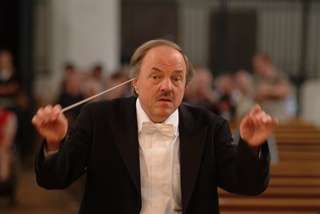|
Back
Let joy be proclaimed! Toronto
Koerner Hall
02/04/2016 - & February 5*, 6, 7, 2016
Josef Rheinberger: Abendlied, op. 69, no. 3
Jeffrey Ryan: Valediction
Johannes Brahms: Warum ist das Licht gegeben, op. 74, no. 1
Ludwig van Beethoven: Symphony No. 9, op. 125
Sigrid Plundrich soprano), Mary-Ellen Nesi (mezzo-soprano), Colin Balzer (tenor), Simon Tischler (bass-baritone)
Tafelmusik Chamber Choir, Ivars Taurins (choir director), Tafelmusik Baroque Orchestra, Bruno Weil (conductor)

B. Weil (Courtesy of Tafelmusik Baroque Orchestra )
The Tafelmusik Baroque Orchestra is completing its recorded cycle of Beethoven’s symphonies with this series of four performances of Symphony No. 9.
The first part of the program consisted of three a capella choral works chosen to complement aspects of the Choral Symphony. Rheinberger’s Abendlied, for example, echoes the most transcendental section of Schiller’s ode. Jeffrey Ryan’s Valediction, to a poem by Norma West Linder, is a Tafelmusik commission given its premiere. The composer’s note refers to “past pain and future promise”, “renewal and rebirth”. Its finely blended lines drift into silence. Brahms’ Warum ist das Licht gegeben provided a dramatic contrast and ended with consoling warmth. All three works were given meticulous performances. Toronto has many fine choirs and Ivars Taurins over the years has made the Tafelmusik Chamber Choir one of the best.
The care given to the three choral pieces carried over into the performance of the symphony. The orchestra was boosted to 51 players (its largest incarnation I can recall), a factor that didn’t get in the way of some very delicate passage work. Bruno Weil seems to have put the piece under a microscope so that detail can be fully expressed, while overall the work was given a sure pulse that resulted in an organic whole. Various “voices” in the orchestra - for example the tangy cellos - came across as fresh discoveries. I feared at first that a choir of just 32 might lack the required weight, but each section gave the required impact, particularly the sopranos with Beethoven’s fiendishly innovations. The four soloists - all well-selected - contributed ably.
The whole performance was a natural fit for Koerner Hall and the rapt audience responded with a well-deserved gran furore. There must surely be hundreds of recordings of this landmark work and Tafelmusik’s is sure to interest many.
Michael Johnson
|